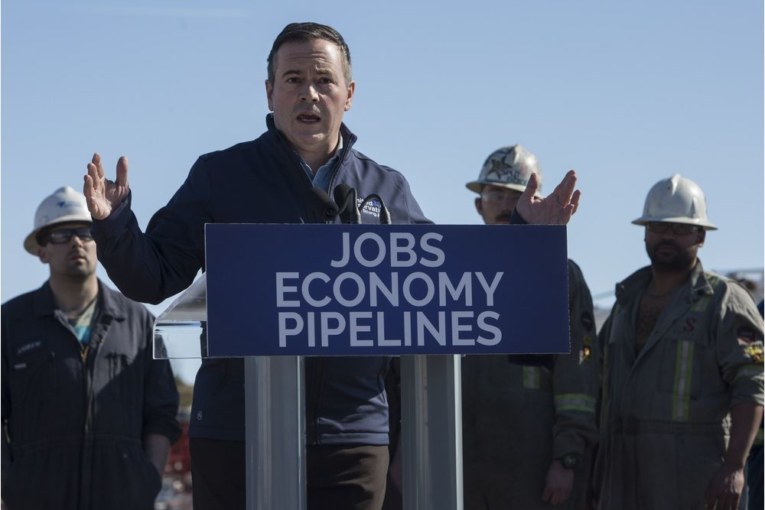
NDP Leader Rachel Notley launched the 2019 provincial election campaign Tuesday in downtown Calgary with talk of fighting for jobs, diversifying the economy — and battling for pipelines.
United Conservative Party Leader Jason Kenney kicked off his campaign in front of a rig in Leduc talking about the economy, jobs — and pipelines. (Those words were literally on the sign resting under his microphone.)
As Albertans head to the polls on April 16, the race will focus on an array of issues facing the economy today, from high unemployment and weak investment levels to curtailment and the fragile state of the oil and gas sector.
To modify a line from former U.S. president Bill Clinton’s campaign, it’s about energy, stupid.
Alberta has diversified and expanded in areas such as technology and financial services in recent years, yet the oilpatch remains the powerhouse behind the economy.
Today, it’s like a car stuck in a ditch, trying to regain traction.
Until new oil pipelines are built, other problems surrounding reduced oilpatch capital spending, less drilling and a choppy recovery won’t fade away.
“Pipelines will be central,” Notley told reporters in Calgary, a city still recovering from the global oil price downturn that began four years ago.
“I believe we are closer than we ever have been before … it’s been over 60 years since a pipeline to tidewater has been built. It’s not an easy task.”
Kenney began his campaign outside Total Energy Services in Leduc, an oilfield services company hit hard by the recession.
The company shuttered five branches in Western Canada last year.
“We would move from the NDP’s reactive, passive, defensive approach on pipelines to a proactive, strategic and assertive approach,” Kenney said.
For the energy sector, being stuck in the crosshairs of a volatile political campaign is not a comfortable spot to be, but building energy infrastructure is a linchpin for unlocking future growth.
Oil production has increased by 20 per cent since 2015, yet legal and regulatory hurdles on both sides of the Canadian-U.S. border have obstructed pipeline construction, costing the province millions of dollars a day.
In the past month, Enbridge’s Line 3 project and TransCanada’s Keystone XL pipeline have both faced setbacks in the U.S.
The Trudeau government spent $4.5 billion last year to buy the Trans Mountain pipeline, but a legal ruling put the expansion project on hold.
Without sufficient pipeline capacity, the province has had to restrict oil production.
The winter drilling season in Western Canada was down almost 30 per cent from 2018 levels, noted Kevin Neveu, CEO of Precision Drilling.
“What we see in Canada is our customers are concerned, worried . . . and still don’t have a good sense of increased pipeline capacity,” he said in an interview.
“The uncertainty we feel as a service company is felt by many, many Albertans.”
However, the pipeline issue is largely out of Alberta’s direct control.
After all, the federal government is responsible for regulating cross-border energy infrastructure.
Whoever sits in the premier’s chair doesn’t have a lot of ability to push a project ahead. Instead, they’re left to needle and compel the federal government to move the ball forward.
“We would wish that (pipelines) wouldn’t be a central point of an election, but we are where we are,” said Chris Bloomer, head of the Canadian Energy Pipeline Association.
“Both parties are really going to put a focus on this issue as part of their campaign . . . but they can’t wave a magic wand and make things happen.”
While the two major parties agree on the need for new pipelines, they have vastly different plans for the energy industry.
Notley is pushing a plan to provide $3 billion in loan guarantees, grants and royalty credits to attract new petrochemical facilities and partial upgrading projects to the province, adding value to Alberta’s natural resources.
Kenney sees the idea as picking corporate winners and losers and would ditch such subsidies. Instead, he’s touting a broadly based corporate income tax cut, dropping the rate by a third to kick-start growth.
Notley has advocated for spending $3.7 billion on leasing rail cars to transport more oil out of the province, but says it will unlock $5.9 billion in higher revenues, royalties and taxes.
Kenney believes the private sector will take care of oil-by-rail shipments and has vowed to cancel the “boondoggle.”
Notley backs a carbon tax and cap on greenhouse gas emissions from the oilsands.
Kenney opposes both ideas.
The backdrop for this clash is the tepid state of the broader economy.
Crude prices are up this year, topping US$59 a barrel on Tuesday, although conventional oil and gas investment is expected to fall by nine per cent this year.
In February, Alberta’s unemployment rate rose to 7.3 per cent, and housing starts are down sharply.
“You have had a number of months now in a row with some pretty disappointing economic news,” said University of Calgary economist Trevor Tombe.
“My largest concern now is the self-fulfilling nature of negative expectations.”
If entrepreneurs and consumers lose confidence in the economy, they will spend less. Holding off on new investments would only make the situation worse.
“There is just a frustration of an inability to move forward. Businesses want to grow,” added Sandip Lalli, CEO of the Calgary Chamber of Commerce.
A 28-day campaign won’t solve all of these economic problems, although it will offer distinctly different visions for the oilpatch’s future.
Other issues will grab the spotlight in the coming days, but expect energy and pipeline concerns to take a big turn on centre stage during Alberta’s election showdown.
Chris Varcoe is a Calgary Herald columnist.
You can read more of the news on source
